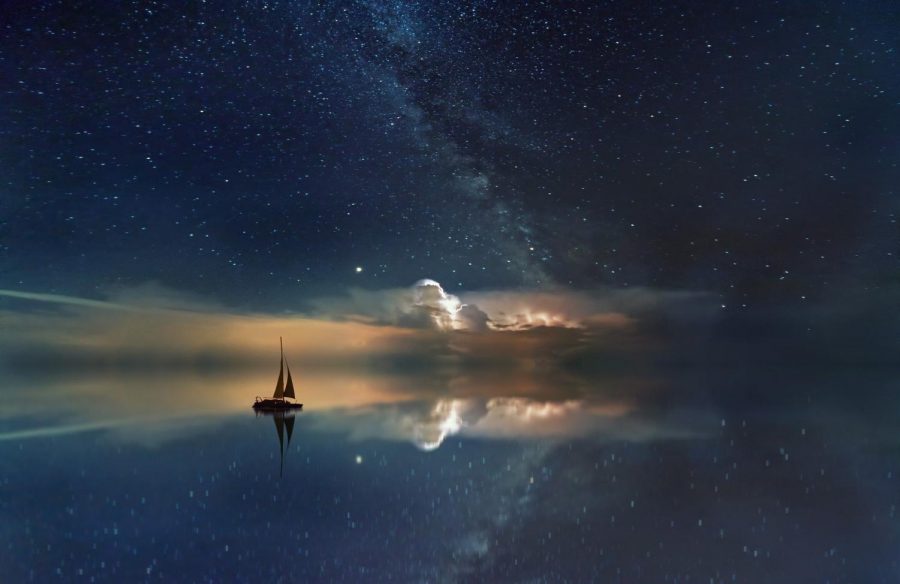Wonderfully Wild: Adapting a Childhood Classic
https://pixabay.com/images/id-3605547/
February 16, 2021
Diving headfirst into the complex, at times bizarre, and blissful world of a child’s imagination whilst tackling tough topics of trauma, areas of abandonment, and lingering leitmotifs of loneliness, 2009’s Where the Wild Things Are, directed by Spike Jonze, captures real emotions and inner turmoil in an otherworldly, surreal, and unique setting and experience.
Spike Jonze’s interpretation of Maurice Sendak’s classic children’s story Where the Wild Things Are breaks boundaries, defies definition, and exceeds expectations; it’s a one–of–a–kind melancholic masterpiece.
As a childhood fan of the beloved children’s story, I watched this live-action adaption with unrealistic expectations. I regret to say that as a kid, I was wildly disappointed in this movie and almost felt as though a once happy memory from my childhood was mutilated and ruined forever. Although it was marketed to children, this darker, much more abstract take on the story is far from a kid’s movie. Upon watching it again, many years later, my negative opinion of this film could not be more different.
Through masterful directing, writing, and producing, the film offers insight into a child’s life, imagination, and troubling, difficult to understand emotions, leading the viewer to reflect and deeply sympathize with the characters. Max (Max Records) reverts to childish behaviors and negative attention–seeking habits when he begins to feel neglected by his older sister (Peppita Emmeriches) and his preoccupied single mother (Catherine Keener).
When Max gets into a particularly nasty spat with his mother while she is entertaining her boyfriend (Mark Ruffalo), he flees from home to escape his negative emotions. Losing himself in the local woods and his own confusion and emotional peril, he boards a small boat and embarks on a journey down a small pond, which widens into an ocean, taking him far away from the responsibility of coping with life.
He sails until he comes across an island where he stumbles upon a tribe of mythical beast-like creatures causing destruction and arguing amongst themselves; his life is changed forever. He presents himself as a king from a distant land and takes over as their true ruler, to the fear and respect of the Wild Things.
After many adventures, Max comes to realize that being a king isn’t all it was cracked up to be, that actual responsibility and accountability is overrated, and how his mother, who was doing her best, must have felt about his obtrusive outbursts. It’s a classic “grass is greener” type of epic with themes of self-discovery, maturity, imagination, and truth-hurts reality.
The score of Where the Wild Things Are is unlike anything written for a film before. It’s simple, eerily blissful, and full of enigmatic angst. Comprised of works by Karen O, the vocalist of the Yeah Yeah Yeahs, and Carter Burwell, a talented instrumentalist and composer, the music of this film haunts dreams and perfectly encapsulates the mixed up, yet simple emotions of a child.
Of the many things that make this a wonderful production, the designs and execution of the Wild Things themselves is one of the biggest details. The brilliant minds over at Jim Henson’s Creature Shop created these larger-than-life beings; no other company could pull this off. Responsible for the worlds of Sesame Street, The Dark Crystal, The Muppet Show, Labyrinth, Fraggle Rock, and so much more, Jim Henson revolutionized bringing otherworldly creatures to life. His company continues his legacy to this day long after his death, and never ceases to amaze.
The visual experience of this film is unique. How a film can be so simplistic, monotone, and bleak yet colorful and subtly beautiful at the same time is absolutely beyond me. It defies what you thought of gorgeous cinema before. Wide, phenomenally constructed panoramic nature shots, intermixed with shaky, uneasy camera perspectives creates a surreal and interesting viewing journey.
The reviews for Spike Jonze’s Where the Wild Things Are were decidedly mixed, some claiming it to be a defamation of an iconic piece of literature and others saying it is the film of this generation. I’m disappointed in my six-year-old self’s taste in cinema, because this movie is the epitome of cinematic perfectionism.


